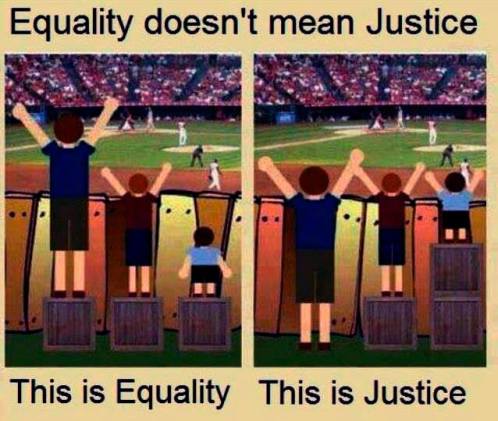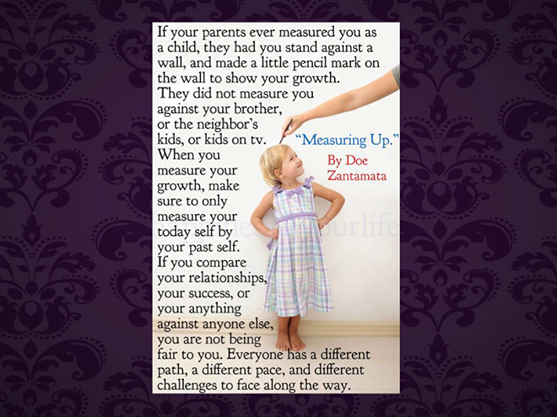Part of the reason there has been such strong disagreement and debate regarding the Common Core is people “see” ed reform and the new Standards very differently, depending on their perspective.
For example when teachers express concern regarding the validity of VAM and the use of standardized test scores to measure student learning and teacher quality, many ed reformers and even the media will claim that teachers don’t want to be evaluated or held accountable for their students’ performance.
When teachers raise the issue of poverty and how it impacts student learning many reformers respond that “poverty is not destiny” and accuse teachers of furthering a #beliefgap rather than just acknowledging that students living in poverty are disadvantaged and they will require additional supports and services.
Most teachers understand that it would be misleading to suggest that students living in poverty are destined to be unsuccessful in life just as it is disingenuous to claim that a single data point can determine and predict the college readiness of elementary students or measure the effectiveness of their teachers.
Ed reformers have a strong belief and faith in the “power” of higher standards to act like a rising tide and lift all boats.
The Common Core “tide” of higer expectations may well rise in all schools across the nation but that will not change the fact that the “boats” in our classrooms are of different design and capabilities ranging from yachts to row boats and even rafts.
And while this academic “tide” will continue to rise, that will also not change the fact that many of the “boats” are also in dire need of repair as they have “holes” in them and some are “sinking”.
I believe that many ed reformers are looking at education from a macro perspective and national point of view. They are evaluating the quality of education programs in schools from a distance and EQUALITY of learning standards is the main priority.
Reformers want students regardless of zip code, to have the same standards of performance in their schools and the same opportunities to be successful in life. This emphasis on equality and uniformity explains why reformers are strong supporters of national standards and assessments.
On the other hand, public school teachers view education up close every day from a micro perspective. Aware of the cognitive, economic, social, and emotional differences between their individual students, teachers are focused more on finding EQUITABLE or fair solutions and customized strategies to support and increase student learning in their classrooms and communities.
Teachers are not opposed to higher standards for students, we just want to make sure that EQUITABLE resources, support services and diverse college/career “pathways” are available in order to facilitate the learning of disadvantaged, discouraged, disinterested, delayed and disabled learners.
Standards-based reforms and EQUALLY high expectations for all students seems a reasonable approach from ed reformers macro perspective, but teachers with their micro perspective and experiences are more concerned about EQUITY especially when they observe Race to The Top funds being spent on new computers, software solutions, and standardized tests while funding and staffing is reduced or eliminated for arts programs, sports programs, field trips, and essential wrap around services that support and promote student learning.
Jamie Vollmer’s insightful “Blueberry Story” reveals what happens when the misperceptions and miscalculations of a businessman are challenged by an experienced teacher.
“I represented a group of business people dedicated to improving public schools. I was an executive at an ice cream company that had become famous in the middle1980s when People magazine chose our blueberry as the “Best Ice Cream in America.”
I was convinced of two things. First, public schools needed to change; they were archaic selecting and sorting mechanisms designed for the industrial age and out of step with the needs of our emerging “knowledge society.”
Second, educators were a major part of the problem: they resisted change, hunkered down in their feathered nests, protected by tenure, and shielded by a bureaucratic monopoly. They needed to look to business. We knew how to produce quality. Zero defects! TQM! Continuous improvement!
In retrospect, the speech was perfectly balanced — equal parts ignorance and arrogance.
As soon as I finished, a woman’s hand shot up. She appeared polite, pleasant. She was, in fact, a razor-edged, veteran, high school English teacher who had been waiting to unload.
She began quietly, “We are told, sir, that you manage a company that makes good ice cream.”
I smugly replied, “Best ice cream in America, Ma’am.”
“How nice,” she said. “Is it rich and smooth?”
“Sixteen percent butterfat,” I crowed.
“Premium ingredients?” she inquired.
“Super-premium! Nothing but triple A.” I was on a roll. I never saw the next line coming.
“Mr. Vollmer,” she said, leaning forward with a wicked eyebrow raised to the sky, “when you are standing on your receiving dock and you see an inferior shipment of blueberries arrive, what do you do?”
In the silence of that room, I could hear the trap snap…. I was dead meat, but I wasn’t going to lie.
“I send them back.”
She jumped to her feet. “That’s right!” she barked, “and we can never send back our blueberries. We take them big, small, rich, poor, gifted, exceptional, abused, frightened, confident, homeless, rude, and brilliant. We take them with ADHD, junior rheumatoid arthritis, and English as their second language. We take them all! Every one! And that, Mr. Vollmer, is why it’s not a business. It’s school!”…
Since then, I have visited hundreds of schools. I have learned that a school is not a business. Schools are unable to control the quality of their raw material, they are dependent upon the vagaries of politics for a reliable revenue stream, and they are constantly mauled by a howling horde of disparate, competing customer groups that would send the best CEO screaming into the night.”
Jamie Vollmer, The Blueberry Story: The teacher gives the businessman a lesson
Teachers know that fairly assessing student learning and teacher performance requires a more customized, comprehensive, and holistic approach, rather than a rigid and standardized evaluation system that simply counts how many students meet a standard of performance at a specific moment in time.
Doe Zantamata believes a more EQUITABLE way to assess student learning and growth would be using a student-centered “Measuring Up” system that recognizes, “Everyone has a different path, a different pace, and different challenges to face along the way.” rather than a test-centered system that expects each child to learn and “grow” in a synchronized and standardized way.





Pingback: Just Have Coffee | WagTheDog
Pingback: Common Core: A Matter of Perspective | Desde mi Salón
Pingback: Cognitive Privilege | WagTheDog
Pingback: Common Cure: Growing Pains or Growing Awareness? | WagTheDog
Pingback: #whatif… | WagTheDog
What this shows is the education system is working. It is raising generations of Americans who do what they are told by the media, abdicate their free will, and do what they are told like good Prussians should. Common core is an affront to the humanities. I wonder what Plato’s discourse on it would be?